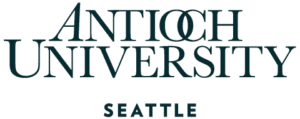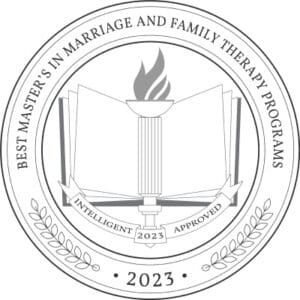Master of Arts
MA in Couple & Family Therapy
Make a difference in the lives of individuals, couples, and families.
The Couple and Family Therapy Program helps adult students pursue a rewarding and meaningful career that enhances the lives and relationships of individuals, couples, and families.
By focusing on a family systems perspectives and pairing the traditional classroom setting with comprehensive clinical training and onsite internships, you will be better prepared for licensure as a Marriage and Family Therapist in Washington State.
This degree is offered by Antioch University's Seattle Campus.
This campus-based program is not enrolling in 2025.
Please click here to learn more about our low-residency MA in Couple & Family Therapy. Accredited by COAMFTE since 1993 and in a low-residency format convenient for working adults, graduates with this degree are eligible for American Association for Marriage and Family Therapy (AAMFT) clinical membership and licensure or certification.
Program Overview
The mission of the Antioch University Seattle Couple and Family Therapy (CFT) program is to prepare and train knowledgeable, skilled, self-aware, ethical, and anti-racist couple and family therapists in a learning environment that centers anti-white supremacy and social justice in its academic experience.
The CFT Program is dedicated to meeting the needs of the students which is reflected in the following figures:
- 99% of graduating students indicated they would recommend the CFT Program to others (2019 Graduation Survey Report, n=81)
- 100% of alumni indicated they passed the national exam for licensure (Alumni Survey Report 2019, n=67)
- 99% of alumni indicated they are currently working in the field of therapy, and it took them an average of 2 months to find a job (Alumni Survey Report 2019, n=67)
The CFT Program has been accredited by the Commission on Accreditation for Marriage and Family Therapy Education (COAMFTE) since 2005, which is the highest level of accreditation in marriage and family therapy. This allows graduates to use their internship hours toward their post-graduation licensure requirements, which ultimately makes licensure attainment easier and faster.
Client populations for couple and family therapists include children, teens, and adults, as well as couples and families. Couple and family therapists primarily work with clients from theoretical perspectives that are more interpersonally and systemically oriented. In this sense, CFT practitioners concentrate more on the relational, social, and cultural experiences of their clients while taking into account the context of their inner world.
The CFT Program demonstrates its commitment to the advancement of social justice by preparing therapists to think critically about power, privilege, and multicultural issues in order to best serve clients and communities. Consistent with a systemic perspective we believe that by empowering our students with relevant knowledge as well as clinical and advocacy skills, the requirements of social justice will be served for clients and within the larger community.
The educational philosophy of the CFT Program is based on a model of adult learning that is student-centered and competency-based. The student-centered aspects of this model emphasize establishing learning environments characterized by collaboration, self-direction, and self-reflective practice. In this way, our courses emphasize experiential learning rather than focusing on lectures and testing. Students are evaluated on their therapeutic abilities rather than their ability to take a test. Along these lines, we do not utilize the GRE in our admissions process.
Students in the CFT Program can receive additional training by specializing in Art Therapy, Drama Therapy, Sex Therapy, Multicultural Therapy, and Play Therapy.
Licensure Information
This program is designed to lead to state licensure.
Program Goals
CFT Program Goals (PGs):
- PG 1: Admit and graduate a more diverse student body.
- PG 2: Graduate students who demonstrate a relational and systemic philosophy and ethics in their clinical practice.
- PG 3: Graduate students who integrate multiculturally-attuned clinical knowledge, skills, and research that is adaptable to work with client populations of varying social locations and contexts.
- PG 4: Graduate students who promote inclusion, respect for diversity, anti-discrimination, and social responsibility from a culturally responsive perspective.
- PG 5: Graduate students who identify as systemic therapists who are prepared to seek employment as and meet state licensure requirements for marriage and family therapists (LMFT).
CFT Student Learning Outcomes (SLOs)
- SLO 1: Students will integrate and apply systemic and anti-oppressive clinical knowledge, theories, skills, research, healing practices, and evidence-based treatments that are adaptable to work with client populations of varying social locations and contexts.
- SLO 2: Students will effectively use couple, relational, and family systems theories to inform systemic case conceptualizations and treatment plans in their clinical work.
- SLO 3: Students will demonstrate legal and ethical competence by understanding and adhering to relevant laws and ethical codes including the AAMFT Code of Ethics.
- SLO 4: Students will demonstrate differentiated and culturally-attuned positions while engaging in critical and exploratory conversations with classmates from backgrounds and perspectives different than their own.
- SLO 5: Students will demonstrate and integrate an anti-racist and anti-oppressive stance in their knowledge and application of systemic clinical theories, models, healing practices, and evidence-based treatments.
Degree Requirements
Program Length:
Degree Completion Timeline The length of the program depends on the pace students choose to move through the program. While the average time to graduation is 3.5 years, some students graduate as quickly as 2.25 years while others choose to take up to 6 years. As a student, it's up to you. Minimum length: 2.25 years (9 full-time* quarters) Maximum length: 6 years (including quarters taken off from the program) Average degree time: 3.5 years
*Please Note: According to the Financial Aid Office, enrollment of three credits is considered half-time for graduate students and therefore eligible for financial aid. Taking at least six credits is considered full-time enrollment.
Requirements:
The CFT program requires the completion of 77 quarter credits, including 49 credits of required coursework, 12 elective credits, and 16 credits of Internship.
The CFT program's mission is to prepare knowledgeable, skilled, self-aware, ethical, and anti-racist couple and family therapists in a learning environment that centers anti-white supremacy and social justice in its academic experience. This mission is accomplished through a combination of required coursework, electives, practical experience, and a supervised internship. The CFT curriculum meets the educational requirements for licensure as a Marriage and Family Therapist in the State of Washington. It is professionally accredited by the Commission on Accreditation for Marriage and Family Therapy Education (COAMFTE).
Take a Look at the Catalog for a Full List of Requirements and Courses
Internship Experience:
All students participate in an internship in a professional setting. This experience will enable you to validate and clarify the theory you acquire in the classroom as you develop your own role as a clinician. Examples of internship sites include the following:
- Youth and family service centers
- Public mental health clinics
- Grief and Loss Agencies
- LGBTQIA Agencies
- ADHD Centers
- College counseling centers
- Group homes
- Homeless shelters
- Community centers
- Penitentiaries
- In-patient psychiatric hospitals
For detailed curriculum, degree requirements, and course descriptions, please visit the AUS catalog.
Career Outlook
According to a 2014 AAMFT report on the Bureau of Labor Statistics, there are currently over 11,000 jobs for marriage and family therapists (MFTs) with employment projected to grow 29% between 2012 and 2022. MFTs can thrive in a range of work environments, including mental health centers, hospitals, substance abuse treatment centers, schools, private practice, and many other settings. The following is a list of possible jobs (some require additional post-master’s education):
-
- General Psychotherapist
- Specialist (Military Family, Domestic Violence, Childhood Sexual Abuse, Child Abuse Prevention, Parenting, Marital, Family, Adult, Infant Specialist, Bilingual Mental Health, Inpatient, Adolescent Specialist, Group, Hospital-Based, Multicultural Specialist, LGBTQIA, Sex, Contracted, Substance Abuse, School-Based, Corporation-Based, Eating Disorder, Hoarding Disorder, Play, Pastoral, Parent-Child Interaction Therapist, Wraparound, In-Home, Triage and Crisis Team, Outreach, Deaf and Hard of Hearing)
- Early Childhood Mental Health Clinician
- Clinical Supervisor
- Research Assistant
- Agency Director
- Private Practice
- Group Practice
- Therapist Trainer
- Teletherapy provider
- In-Home Therapist Supervisor
- Child Protective Services Professional
- Author
- Political Advocate
- Mental Health Professional
- Behavioral Health Provider
- Utilization Review Coordinator
- Program Director
- Instructor in a Bachelor’s Program or Master’s Program
-
Learning Outcomes
The CFT program:
- Prepares competent couple and family therapists
- Demonstrates a commitment to diversity
- Prepares students to pass the MFT national exam
- Prepares students for employment in couple and family therapy
CFT students demonstrate:
- Knowledge relevant to individual, couple, and family therapy
- Skills relevant to individual, couple, and family therapy
- Self-awareness
- Ethical behavior
- Awareness and sensitivity regarding diverse populations
SLOs
- SLO 1: Students will integrate and apply systemic and anti-oppressive clinical knowledge, theories, skills, research, healing practices, and evidence-based treatments that are adaptable to work with client populations of varying social locations and contexts.
- SLO 2: Students will effectively use couple, relational, and family systems theories to inform systemic case conceptualizations and treatment plans in their clinical work.
- SLO 3: Students will demonstrate legal and ethical competence by understanding and adhering to relevant laws and ethical codes including the AAMFT Code of Ethics.
- SLO 4: Students will demonstrate differentiated and culturally-attuned positions while engaging in critical and exploratory conversations with classmates from backgrounds and perspectives different than their own.
- SLO 5: Students will demonstrate and integrate an anti-racist and anti-oppressive stance in their knowledge and application of systemic clinical theories, models, healing practices, and evidence-based treatments.
Upcoming Events
Recent News
-
Kate Patterson Leads Inspiring Psychology Training Conference in Connecticut
on July 14, 2025
-
Amy Morrison Presents Workshop at International Expressive Arts Therapy Association Conference
on June 19, 2025
-
The Vital Role of Gender Affirmation in Therapy for TGNC Individuals and Their Families
on June 17, 2025


